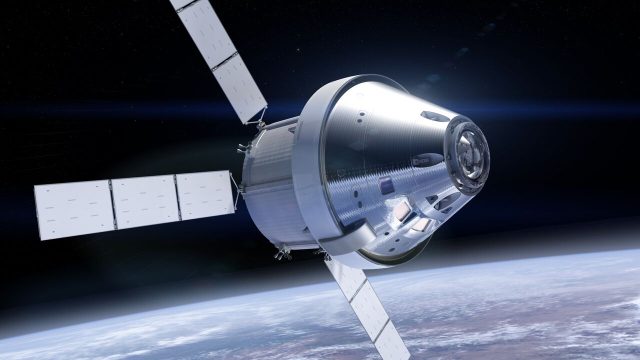
At the request of Congress, the nonpartisan US Government Accountability Office reviews the finances and management of federal programs, and this week it released a study critical of NASA’s crew capsule, Orion. Most worryingly, the 56-page report (PDF) regularly draws parallels between the Orion program and another large NASA project, the James Webb Space Telescope. The successor to the Hubble Space Telescope is notorious for ballooning from a 10-year, $500 million project to a 20-year, $8.8 billion (£6.7 billion) instrument that may finally launch in 2018.
Although Orion has not yet experienced such dramatic increases in costs, the spacecraft is now into its second decade of development. NASA estimates that it will spend a total of $16 billion (£12 billion) to ready Orion for its first crewed flight in April 2023. However, the GAO review, signed by Director of Acquisition and Sourcing Management Cristina T. Chaplain, did not find these numbers to be reliable.
The federal auditing agency based this conclusion on the fact that only a handful of NASA’s methods for estimating costs and schedule were consistent with “best practices.” Moreover, the GAO found, in making a number of its estimates, NASA appears to be relying too heavily on data analysis from the primary contractor for Orion, Lockheed Martin. In regard to Orion’s cost and schedule estimates, then, the GAO report concludes, “They do not fully reflect the characteristics of quality cost or schedule estimates and neither estimate can be considered reliable.”
Some of the major Orion concerns cited by the GAO study are well-known, such as delays by NASA’s partner, the European Space Agency, in building the service module that will help power Orion in space. Less widely known, however, are significant cost overruns with Orion’s primary contractor, Lockheed Martin. The GAO’s analysis of contractor data found that the Orion program faces potential cost overruns of up to $707 million by 2020.
The report comes at an important time for Orion, which will likely face questions about its viability during the next 18 months as a new president comes into office and reviews NASA’s programs. Congress supports NASA’s development of the vehicle, but there is considerable back-channel discussion in the aerospace community about the time and expense that has gone into developing what is a capable but relatively straightforward spacecraft.
A long time coming
Few blame the NASA engineers themselves for these difficulties, but rather changing requirements and bloated government procurement processes for a program that formally began in 2006. The 5-meter capsule has seen significant modifications during that time, first envisioned as a means to transport astronauts to the space station and now more focused on deep space exploration.
It's nevertheless striking that it will probably take NASA about 17 years to design and develop Orion before finally flying its first crewed mission in 2023. During the same amount of time, from 1964 to 1981, the space program flew the Gemini spacecraft; designed, developed, and flew the Apollo capsule; and designed, developed, and flew the much more complex space shuttle.
The GAO report also notes that there is some question about the viability of the 2023 launch date for Orion’s first crewed mission, Exploration Mission-2, a 10- to 14-day crewed flight that will orbit the moon before returning to Earth. NASA has publicly said it has 70 percent confidence in that launch date, but an internal NASA review cited by the GAO found that this launch date may slip six months.
Despite these concerns, NASA is pressing ahead with an effort to try and accelerate development of Orion to enable an August 2021 launch of Exploration Mission-2. Yet the GAO found this scenario improbable. “To stay on the aggressive internal schedule, the agency is counting on receiving higher appropriated funds than what it plans to request, which may not be realistic in a constrained budget environment,” the report states. There is low confidence—40 percent—in NASA making the 2021 launch date, and the GAO believes this may not be a “beneficial strategy” for Orion in the long term.
Deferred work
One of the final, most worrisome aspects of the Orion program noted by GAO is NASA’s practice of deferring work on the vehicle to later this decade. That is, with constrained budgets now, NASA and Lockheed Martin are delaying development of some spacecraft systems. This positions the program poorly in terms of handling “a bow wave” of deferred work as well as inevitable technical challenges when Orion is integrated with the Space Launch System rocket.
“The Orion program may find itself in a similar situation to that experienced by the Constellation and (James Webb Space Telescope) programs, which had minimal cost reserves in early years to handle technical challenges that manifested and forced the programs to defer work,” the report states.
As an example of some of the deferred work, the report notes a number of critical life-support and related systems that were originally planned to fly in Exploration Mission-1, an uncrewed test flight of Orion and the Space Launch System rocket tentatively scheduled for late 2018. These include air revitalization, fire detection and suppression, pressure control and waste management, an active launch abort system, emergency communications, and other systems. It is problematic to fly many of these systems for the first time with astronauts on board, the GAO found.
It remains unclear whether the new report will shake Congress’ confidence in Orion. Back in 2009, when the GAO concluded that Orion and another new NASA rocket, the Ares I, lacked a “sound business case,” Congress fought against President Obama’s efforts to end Orion. But given ongoing concerns about Orion’s development, it does not seem likely the Washington wars over NASA’s expensive, long-running capsule project have yet reached their conclusion.
reader comments
225